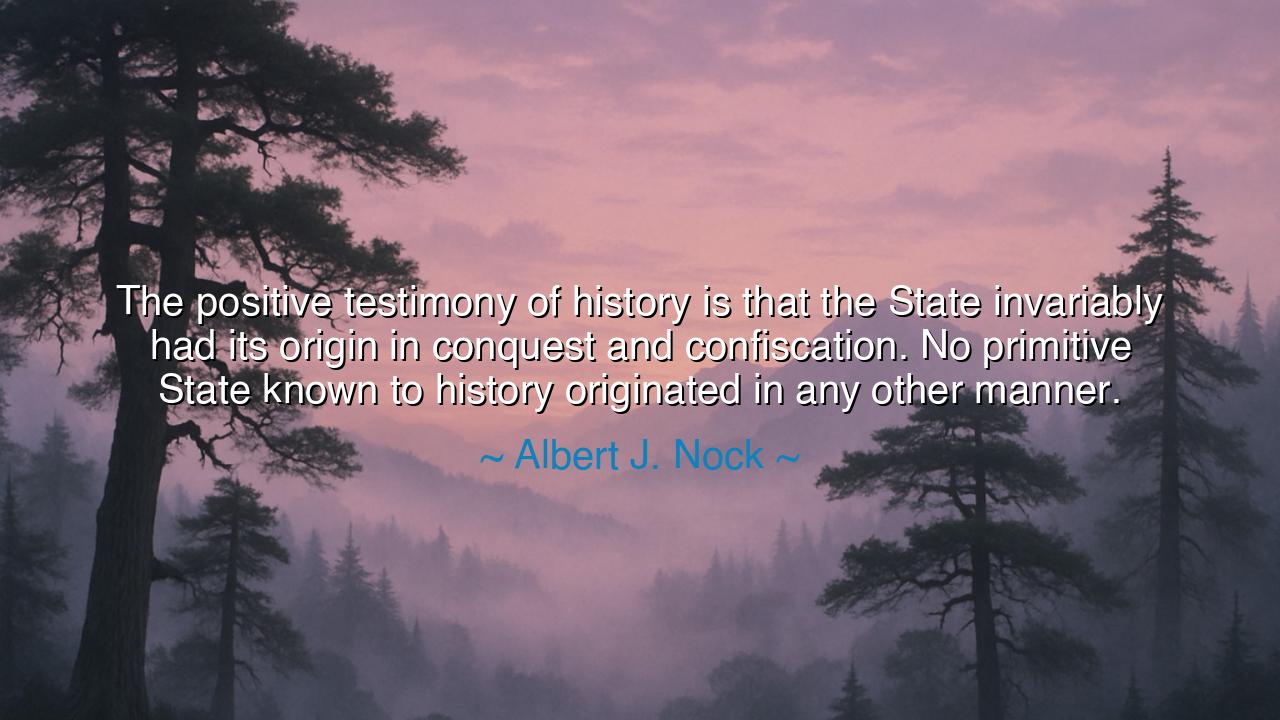
The positive testimony of history is that the State invariably
The positive testimony of history is that the State invariably had its origin in conquest and confiscation. No primitive State known to history originated in any other manner.






Albert J. Nock, with the sharp eye of a historian and the voice of one who unmasks illusions, declared: “The positive testimony of history is that the State invariably had its origin in conquest and confiscation. No primitive State known to history originated in any other manner.” In this striking claim, he pierces the veil of romance that so often cloaks the rise of nations. He reminds us that behind the pageantry of crowns and banners lies the ancient truth: the State was not born of harmony, but of power, taken by force and cemented by seizure.
The essence of this teaching is sobering. While many would like to believe that society arose from gentle agreements or noble compacts, Nock declares that history testifies otherwise. The first States were not born of reasoned consent, but of conquest, where the strong subdued the weak, and of confiscation, where the wealth of the vanquished was taken to sustain the rule of the victor. Thus, what we call civilization was often laid upon foundations of blood and plunder.
History offers many mirrors of this truth. Consider the Roman Empire, whose beginnings lay not in peaceful covenant but in war and subjugation. Rome grew by seizing lands, enslaving peoples, and demanding tribute. Even its laws and institutions, admired for their order, were forged to maintain the power gained through conquest. Or look to the Norman conquest of England in 1066, when William seized the land, divided it among his followers, and in doing so laid the foundation for the English state. Both Rome and Norman England confirm Nock’s claim: that the State emerges not from fairness, but from domination.
And yet, there is wisdom in facing this hard truth. For to understand the origin of the State is to understand its nature. If it was born of conquest, then it will always carry within it the impulse to command. If it was nourished on confiscation, it will always hunger for wealth to sustain itself. Nock does not speak these words to sow despair, but to awaken vigilance. For when we forget how the State began, we may forget to guard ourselves against its excesses.
Let this lesson be passed to future generations: do not be deceived by the outward robes of power. Remember that behind every throne is the story of conquest, and behind every treasury the memory of confiscation. This is not to deny that States can serve, or that they can bring order—but to remind us that their birth was not gentle. The positive testimony of history is a warning carved in stone: freedom must always be guarded, for the State that was born in conquest will, if left unchecked, return to it.






THcao thị thu huyèn
Nock’s perspective brings into question whether we have truly advanced from the brutal origins of state formation. While it’s true that many states were born through conquest, what does this mean for our current systems of government? Are modern states still built on foundations of power and control, or have we moved toward a more peaceful, cooperative approach to governance? Can we truly escape the cycle of historical violence?
BDQuang Minh Bui Dinh
Nock’s observation seems to highlight the darker side of political history, but is this a valid lens through which to view all of history? Could it be that the State’s origin in conquest isn’t always a reflection of an inherent flaw in governance, but rather a product of the times? How do we move forward in light of this, especially in a world that values diplomacy and human rights?
NQNhu Quynh
This quote paints a rather grim picture of the origins of statehood, focusing on conquest and confiscation. But does this historical reality mean that we are doomed to repeat the same patterns of power and control? Or can we redefine statehood in a way that values cooperation, mutual respect, and democratic processes instead of violence and subjugation? Is there hope for a different model of governance?
NN17- Ngoc Nghia
Albert J. Nock’s statement suggests a rather cynical view of history, implying that the formation of states is rooted in violence and exploitation. While it’s undeniable that many early states were born from conquest, does this mean that all states, or even all modern governments, operate on the same foundation? Is it possible that we’ve evolved beyond such origins, or are we still governed by the legacies of those early conquests?